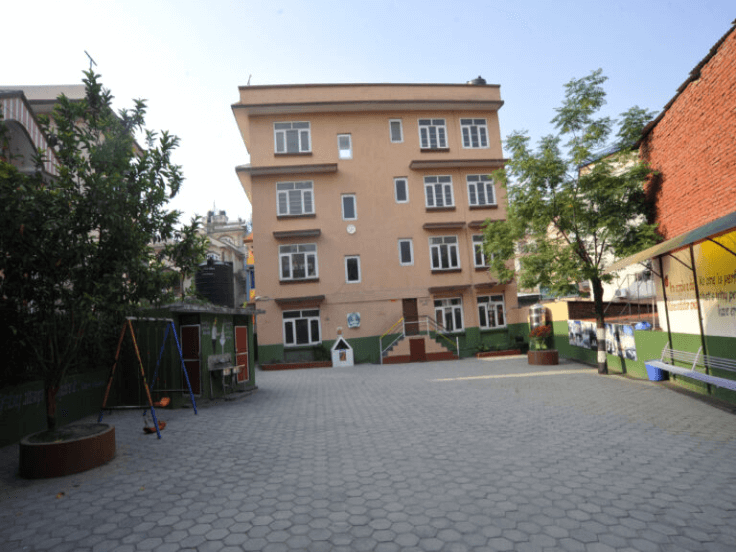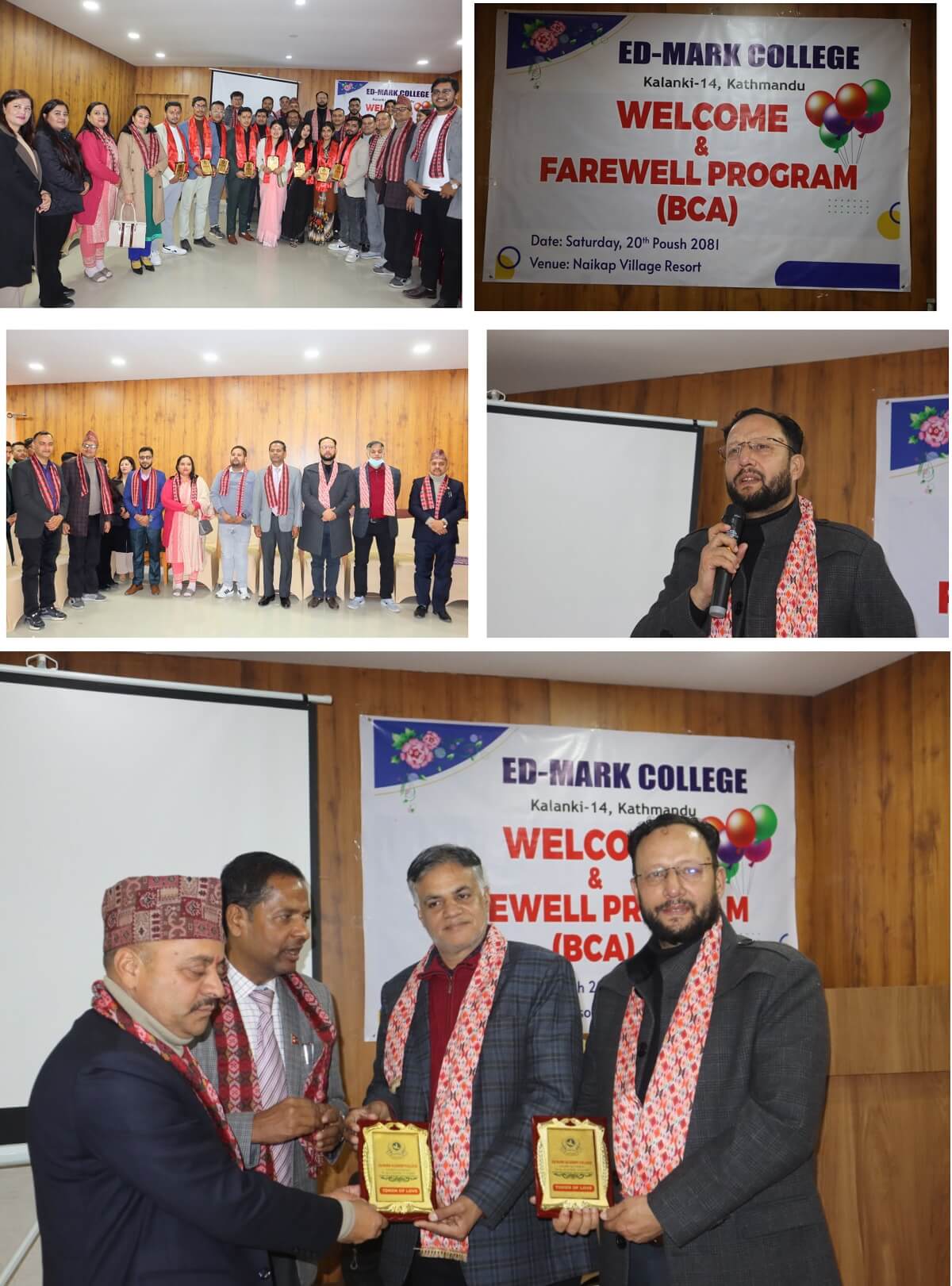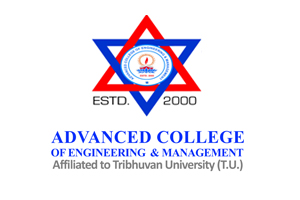Overview
Ed Mark Academy/College in Kalanki, Kathmandu is a private institution serving higher secondary and university-level learners. The institution runs National Examinations Board (NEB) Ten Plus Two (+2) programs in Science, Management, Humanities, and Law, and Tribhuvan University (TU) programs at bachelor’s and master’s levels, including BBS, BASW, BCA, and MBS.
The collegefocuses on clear academic structures, steady student support, and practical learning environments that align with Nepali education standards and expectations of families, teachers, and policymakers.

Quick Highlights
-
Established (Academy): 1999 A.D.
-
College Expansion: 2007 A.D.
-
Location: Kalanki, Kathmandu, Nepal
-
Ownership: Private
-
Affiliations: National Examinations Board (NEB); Tribhuvan University (TU)
-
Academic Levels: NEB +2; Bachelor’s; Master’s
-
Programs: +2 Science, +2 Management, +2 Humanities, +2 Law; BBS, BASW, BCA, MBS
-
Medium of Instruction: English/Nepali (program-specific)
-
Teaching Approach: Classroom lectures, tutorials, AV-supported sessions, group discussions, field exposure where relevant
-
Digital Access: On-campus and online library resources; basic computing orientation
-
Laboratories: Physics, Chemistry, Biology, and Computer labs; discipline-specific practical settings
-
Student Support: Academic counseling, career guidance; code of conduct for safety and discipline
-
Scholarships: Merit and need-based opportunities (as per seat and criteria)
-
Transportation (Illustrative): Two bus routes serving Kalanki and nearby areas; annual fee guideline available on campus notice
-
Sports/ECA: Basketball, cricket, futsal, badminton, table tennis; debates, presentations, seminars
-
Cafeteria: Open on working days (morning to late afternoon), with hygiene checks and student-friendly pricing
Academic Programs Offered
NEB Ten Plus Two (+2)
+2 Science
Students take Physics, Chemistry, Biology, and Mathematics with supporting subjects. Lab work underpins classroom learning. The stream suits learners targeting medicine, engineering, biotechnology, agricultural science, and emerging technical fields. Students who wish to pivot to computing later can keep Mathematics strong through Grades 11 and 12 to remain eligible for IT pathways, including TU programs.
+2 Management
Core areas include Accountancy, Economics, Business Studies, and optional subjects such as Hotel Management or Computer Science. This track builds numeracy, business communication, and introductory managerial concepts useful for BBS, BBA, and hospitality-tourism studies. It suits learners aiming at accounting, banking, entrepreneurship, retail, logistics, and administrative roles.
+2 Humanities
This stream offers Social Studies, Economics, Mass Communication, Rural Development, and language options. It suits students heading toward social sciences, journalism, community development, and public administration. Reading and writing skills, media awareness, and field observation are integral to coursework.
+2 Law
The NEB Law stream covers legal systems, constitutional basics, jurisprudence, and procedural foundations alongside compulsory English and Nepali. It is suitable for students planning to continue into law, public policy, or governance-related studies. The early exposure to legal reasoning supports future entrance into LLB and related programs.
Tribhuvan University Programs
Bachelor of Business Studies (BBS)
BBS focuses on core management areas such as Accounting, Finance, Marketing, HR, Business Law, and Business Environment. Across the four-year TU structure, students move from principles and statistics to strategy, taxation in Nepal, and research methods. Graduates typically enter banking, insurance, trading, manufacturing, NGOs/INGOs, or small enterprise roles. Final year often includes concentration courses and a capstone/research component.
Bachelor of Arts in Social Work (BASW)
BASW introduces social policy, community work, counseling basics, and research ethics. Field orientation is central: students engage with local organizations, observe community programs, and reflect on practice. Graduates work in child and family services, community development projects, public health outreach, and education support roles, or continue toward MSW/MPH and related degrees.
Bachelor in Computer Application (BCA)
BCA is an eight-semester TU program covering programming (C/Java/.NET), data structures, algorithms, web technology, databases, networking, operating systems, software engineering, and applied projects. Coursework often includes cloud and mobile programming electives, professional ethics, and internships. Graduates pursue roles in software development, QA, database administration, web engineering, and IT support.
Master of Business Studies (MBS)
MBS is a two-year TU program structured around advanced courses in Marketing, Finance, HR, Entrepreneurship, Research Methods, and Business Environment. It may include a thesis or seminar papers depending on the campus modality. Graduates move into mid-level management, policy analysis, consulting, or doctoral preparation, depending on interests and prior experience.
Admission Process
Application: Obtain the application form from the college office or designated portal during the admission window.
Screening: The campus uses interviews during form submission and conducts an entrance test aligned with the program. For certain intakes, computer-based testing is used; invigilator instructions must be followed carefully.
Result and Placement: Entrance results are typically announced promptly. Merit lists determine direct admission within the announced deadline. Keep SMS/website notifications switched on and check the campus notice board.
Required Documents (Illustrative):
-
Academic transcripts and character certificates from the previous level
-
Citizenship/birth certificate (copy)
-
Recent photographs as specified
-
Transfer/migration certificate where applicable
Final Enrollment: Admission is confirmed after document verification and fee deposit within the stated timeline. Seat availability can be tight near the deadline, so early applications help.
Teaching Faculty and Learning Methodology
Classes are handled by subject specialists with experience in Nepali curricula and relevant industry exposure. Teaching blends lectures, tutorials, and AV-assisted sessions. Group discussions and presentations build communication and teamwork. Where subjects demand it, field visits, practical labs, and seminars are used to reinforce learning. Students new to digital tools receive orientation to basic computing for assignments, presentations, and library search.
Infrastructure and Learning Facilities
-
Classrooms: Standard classrooms with whiteboards and projection where scheduled.
-
Science Laboratories: Physics, Chemistry, and Biology labs for +2 Science practicals.
-
Computer Labs: Networked labs with internet access for programming, productivity tools, and research tasks.
-
Library (On-site and Online): Textbooks, reference titles, journals, periodicals, and remote resources. Students can search, request, and access materials for assignments and exam prep.
-
Cafeteria: Working-day service from morning to late afternoon with periodic hygiene checks by a college panel of staff and students.
-
Transportation: At least two bus routes cover Kalanki–Sitapaila–Swayambhu–Ramkot–Bhimdhunga and Kalanki–Dhunge Adda–Naikap–Satungal–Thankot corridors; an annual fee guideline is published each session.
-
Digital Access: Support for communication and file sharing; campus updates are shared via notices and official channels.
Student Life and Campus Experience
-
Code of Conduct: The college maintains a clear code that regulates dress, timing, use of mobile phones during class hours, and movement outside campus in uniform. Disciplinary steps are progressive: warnings, guardian notification, fines, or restrictions depending on the case. The aim is a safe, focused, and orderly study environment.
-
Daily Rhythm: Students are expected to arrive before the first period and remain until classes end. Punctuality and attendance are part of academic standing.
-
Health and Safety: The campus encourages healthy habits, respectful conduct, and compliance with safety directions in labs and workshops. Sports participation is subject to academic eligibility and practice commitments.
-
Peer Learning: Study circles, seminar teams, and project groups are common. This helps learners share notes, prepare for tests, and build confidence for presentations and interviews.

Extracurricular Activities (ECA)
-
Sports: Basketball, cricket, futsal, badminton, and table tennis are regular options. Fixtures and practice schedules run through the session.
-
Academic Events: Debates, group discussions, and seminars support writing and speaking skills.
-
Clubs/Units: Subject-interest groups can propose field visits (for example, mass communication site visits or social work field observation) with faculty oversight.
-
Civic/Community Links: Outreach visits and volunteering days may be announced through the year.
Scholarships and Financial Support
The college announces scholarships on merit and need parameters within seat and budget limits. Merit lists often exceed final intake, so students who appear on the list should complete admission steps quickly. Evidence for need-based support is verified as per policy. Renewal of aid usually depends on academic performance and conduct; always check the current scholarship notice for criteria, quota, and deadlines.
Achievements and Institutional Milestones
-
1999 A.D.: Foundation of the academy unit to serve higher secondary learners.
-
2007 A.D.: Expansion into bachelor’s and master’s streams under Tribhuvan University affiliation.
-
Program Growth: Addition of BASW and BCA to diversify undergraduate pathways alongside BBS; continuation of MBS for postgraduate study.
-
Facilities: Steady improvements in labs, library provision, and AV-supported teaching environments.
The campus communicates examination notices, changes to curricula, or policy updates via official channels; students should follow these regularly to stay current.
Why Choose This Institution?
-
Program Range: +2 streams in four disciplines and university programs in management, IT, and social work under NEB/TU frameworks.
-
Location Advantage: Kalanki hub with transport connectivity and two published bus routes serving nearby communities.
-
Structured Teaching: Subject experts, AV-supported sessions, and practical components where required.
-
Resource Access: Physical and online library options with guided search support.
-
Student Support: Counseling, career conversations, and clear code of conduct for a focused academic environment.
-
Progression Paths: +2 learners can move into TU bachelor’s programs; bachelor’s graduates can continue to TU master’s or sector-specific certifications.
Conclusion
Ed Mark Academy/College presents a clear route from NEB +2 to TU undergraduate and postgraduate study in a single campus environment. The academic offer covers science, business, humanities, law, management, IT, and social work. With structured teaching, lab and library access, and a defined code of conduct, learners can plan studies with fewer surprises.
Frequently Asked Questions (FAQ)
1) Which affiliations does the college hold?
NEB for +2 programs and Tribhuvan University for bachelor’s and master’s programs.
2) What +2 streams are available?
Science, Management, Humanities, and Law.
3) Which TU programs run at the campus?
BBS, BASW, BCA, and MBS.
4) How does the admission process work?
Apply within the deadline, attend the interview, sit for the entrance test (as scheduled), and follow the merit list instructions for final enrollment.
5) Is the BCA program semester-based?
Yes. BCA runs across eight semesters with practical projects and internship exposure.
6) What facilities can +2 Science students expect?
Dedicated Physics, Chemistry, and Biology labs; relevant equipment for practical classes; library support for reference study.
7) Are there scholarships?
Yes. Merit and need-based scholarships may be offered within annual quotas. Criteria and deadlines are announced in the admission circular.
8) Does the campus provide transport?
The campus publishes at least two bus routes serving Kalanki and surrounding areas. Annual transport charges are announced each session.
9) What are the main student rules?
Rules cover dress, punctuality, mobile phone use, and movement outside campus in uniform. Repeated breaches may invite fines or restrictions.
10) Are there sports and extracurricular options?
Yes. Basketball, cricket, futsal, badminton, table tennis, debates, presentations, and seminars run through the session.
11) What is the medium of instruction?
English/Nepali depending on program and subject.
12) Where can I confirm current-year fees and seat numbers?
Refer to the latest official notice, campus office, or verified campus communication channels during the admission window.
Contact ED-Mark Academy's administrative office for detailed information on the course, admissions, location, fees, scholarships, facilities, counseling, or eligibility.
Contact Address:
Location: ED-Mark Academy, Kalanki, Kathmandu
Phone: +977-1-1-5225081, +977-1-5225059
Email: info@edmark.edu.np
Website: www.edmark.edu.np



















You need to login to comment.